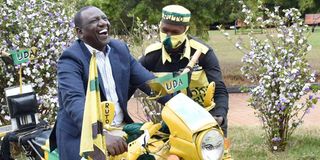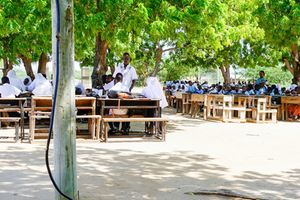Boda boda safety plan great, but the imports bit is riddled with mysteries

A file photo of President William Ruto (Deputy President at the time) trying out a motorbike belonging to a boda boda operator from Murkan in Emurua Dikirr, Narok County. Dr Ruto has launched a care programme catering to boda boda operators.
Boda boda operators have become an integral part of the country’s economy and it would be foolhardy for any government to ignore this sub-sector of the transport industry. These chaps risk life and limb every day to keep Kenyans on the move and they cannot be wished away.
Most of them are a hardworking lot, being forced by circumstances to be at the beck and call of wananchi at all hours of the day, and on standby at night for stragglers late from work, as well as revellers who can hardly hold on to their seats because they are too far gone.
One advantage of boda bodas is that they are relatively cheap compared to more conventional means of transport like matatus or taxis.
The other is that they can reach every town street and every corner of the rugged rural areas. In that sense, they are the most convenient mode of conveyance for many Kenyans, whether in urban or rural areas.
In short, the fellows you see hurtling at breakneck speed on blind corners do not necessarily represent all the members of an otherwise respectable occupation.
These must be some of the reasons that the government this week unveiled a raft of measures that will at once regulate the motorcycle taxi sub-sector while securing the loyalty of the riders who are set to benefit from government largesse that will include free insurance for one year as well as reduced fees for training on road safety and first aid.
As an added sweetener, the lucky few will benefit from reduced licensing fees, and all they need to do is to register with recognised savings and credit and co-operative societies (Saccos). In this case the only question should be what criteria will be used to identify the initial beneficiaries. After all, only 117,000 of the estimated 2.4 million operators will be lucky.
The training aspect is especially important, for it is a fact that too many boda boda operators are untrained and ignorant about road safety, making them extremely prone to causing accidents, thus endangering their own lives, the lives of their passengers, and those of hapless pedestrians and other road users.
It is also a fact that the number of lives lost in accidents has been going up in leaps and bounds every year.
For instance, in 2018, “only” 591 riders died in accidents, but by last year, the number of deaths had more than doubled to 1,270 – in one year.
Flesh and blood
From January to March this year, the country has already lost more than 250 souls and one shudders to imagine what the number will look like at the end of the year.
Dry statistics have a tendency of numbing the mind, but if one pauses to think in terms of flesh and blood, it becomes quite clear that no country which is not at war can afford to lose so many of its youths. This is one of the many reasons the government cannot afford to sit on its hands as boda boda accidents compete in goriness with those caused by wayward matatu and bus crew.
There is a lot more to this decision by the government to organise the boda sub-sector than the operators’ welfare. First, it seems to be a way to fulfill one of its pledges to a politically potent force.
In fact, this could be one way of allaying the discontent that is burbling just below the surface over the high cost of living that will become even more oppressive after the price of fuel goes up due to the doubling of VAT.
Since they do not have the luxury of doubling the fare they charge commuters they will certainly feel the pinch. Not even the promise of allowing them to exchange their fuel-thirsty motorcycles for electric ones is likely to assuage them.
Incidentally, this seems to be yet another promise by the government that will be difficult to implement. The operators have been assured that by December, 100,000 electric motorcycles will be in the country and they can swap their ordinary bikes with the more energy-efficient ones. That would be a great idea if only it was not so riddled with mysteries.
First of all, since the government is not in the business of importing electric bikes, who will do so on behalf of the boda guys? Isn’t it possible that this is just another avenue for tenderpreneurs to make a killing?
It is not a bad idea for the government to play a role in such an important initiative, but it needs to control the greed of motorbike importers who impose usurious interest rates on loans taken by buyers who fall for the promise of instant gratification.
The youths are told they can enter a showroom and leave with new bikes, but in the end, they discover they have been buying the machines at double the price they would have paid had they done so upfront. If they default for even one month, the machines are seized. As a result, many are wallowing in debt and may have no time for attractive promises that could compound their woes.
Mr Ngwiri is a consultant editor; [email protected].





